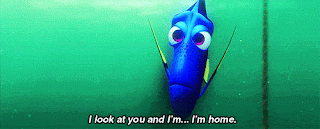Ever since I can remember, I have always been fascinated by art in all its forms, but more precisely, the visual arts. I can spend hours submerged in a museum, looking at paintings and imagining the artist and the kind of life surrounding him at the time he painted it. The concept of art prevailing through the history of human kind as a consistent source of delight has always been interesting for me.
When I first visited Europe, I was mesmerized by the amount of talent compressed in thousands of museums, where I could easily spend entire days roaming around so many different styles and colours. My favourite artist´s name might sound very mainstream, but that does not make me like him any less: Vincent Van Gogh.
As a teenager I read a book about his life and it had extracts from letters to his brother. Many things he wrote there struck a chord in me. I can recognize many aspects of his life that are similar to mine. For instance, I have mentioned in other posts how I struggled with depression for a long time. The way he managed to channel his suffering into colours and light has always been inspirational for me.
 |
| Drawing by Anton Pieck |
My interest for art grew a lot stronger in the last couple of years and around February 2015 I decided to try drawing for the first time - besides those horrid doodles you make as a child your mother so proudly hangs on the refrigerator. Drawing and painting was something I just assumed would never be good at, so I never tried.
I decided I needed another hobby to take my mind off things, so I started drawing. My friends seemed to enjoy the first drawing, and the literary magazine I volunteered for sometimes in my university asked me for permission to post it on their next issue, among other short stories and poems I had already submitted.
 |
| This was the first time I decided to sit down and draw something as a hobby, in february 2015 |
After that I kept drawing. Every time I felt down, every time I felt anxious, I just picked up a piece of paper and let my mind rest on the pen. I have had trouble for this in the last semester: one of our teachers called my attention for doodling in class. It may seem as if I am not paying attention when I am drawing, but the mind works in mysterious ways: I for instance actually pay more attention while doodling. It has to do with the fact that I can be a very anxious person at times and drawing helps me relax while still being able to listen to the lesson. I read in an article about psychology that it is actually scientifically proven that your mind is more attentive while drawing. In case anyone is interested on the study, I will leave the link here:
After about a year of doodling, I started to share my drawings with friends and they have been enthusiastic about it. They have made me question lately whether I should have gone to art school instead of business, but I am not entirely sure if this would be a good idea. See, not even Van Gogh, one of the most influential artists of all times managed to sell one single painting. But my friends keep encouraging me to do more things related to art since they seem to enjoy my drawings. A couple of teachers at Artevelde have already suggested I should start selling them. But how?
 |
| Sketch we had to make in 20 minutes during one of the model sessions I joined this semester at Figure Drawing Ugent |
This brings me to the reason I am writing this post in what should be a "business" blog: Eventually I would love to find a way to combine business with art. I would love being able to work for an editorial that combines writing and illustration of books, or for a museum and eventually even start my own printing company. Ideally I would brand my designs in a way that people could buy merchandise with my designs.
Lately I discovered a website called zazzle.com where you can upload your designs and if people like them, they can order the product and Zazzle will make and send the product for you. The earnings for the artist are very low, but considering all you have to do is uploading your design, I figured I would try uploading a couple of items. This is how one of the items with my design looks like on the website:
In order to make a business out of my passion for art, I would have to gain other skills related to graphic design, and that means I will have to decide whether I should follow night-school for illustration in Ghent, while at the same time combining a part time job and IBM studies or if I should leave it for some other time and focus on my studies in Artevelde. This is something I have been thinking about a lot lately...if you have any idea on how I could successfully juggle those three things at the same time, tips are very welcomed in the comment section!
For now all I have to say is that if you have a lot of passion about a certain hobby, you should find a way to make a living out of it and combine it with your job.
Life is too short not to do what you love!

























